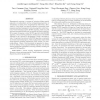Free Online Productivity Tools
i2Speak
i2Symbol
i2OCR
iTex2Img
iWeb2Print
iWeb2Shot
i2Type
iPdf2Split
iPdf2Merge
i2Bopomofo
i2Arabic
i2Style
i2Image
i2PDF
iLatex2Rtf
Sci2ools
113
click to vote
ICASSP
2010
IEEE
2010
IEEE
A robust minimum volume enclosing simplex algorithm for hyperspectral unmixing
Hyperspectral unmixing is a process of extracting hidden spectral signatures (or endmembers) and the corresponding proportions (or abundances) of a scene, from its hyperspectral observations. Motivated by Craig’s belief, we recently proposed an alternating linear programming based hyperspectral unmixing algorithm called minimum volume enclosing simplex (MVES) algorithm, which can yield good unmixing performance even for instances of highly mixed data. In this paper, we propose a robust MVES algorithm called RMVES algorithm, which involves probabilistic reformulation of the MVES algorithm, so as to account for the presence of noise in the observations. The problem formulation for RMVES algorithm is manifested as a chance constrained program, which can be suitably implemented using sequential quadratic programming (SQP) solvers in an alternating fashion. Monte Carlo simulations are presented to demonstrate the efficacy of the proposed RMVES algorithm over several existing benchmark h...
Algorithm | Hyperspectral Observations | Hyperspectral Unmixing Algorithm | ICASSP 2010 | Signal Processing |
| Added | 06 Dec 2010 |
| Updated | 06 Dec 2010 |
| Type | Conference |
| Year | 2010 |
| Where | ICASSP |
| Authors | Arul-Murugan Ambikapathi, Tsung-Han Chan, Wing-Kin Ma, Chong-Yung Chi |
Comments (0)

